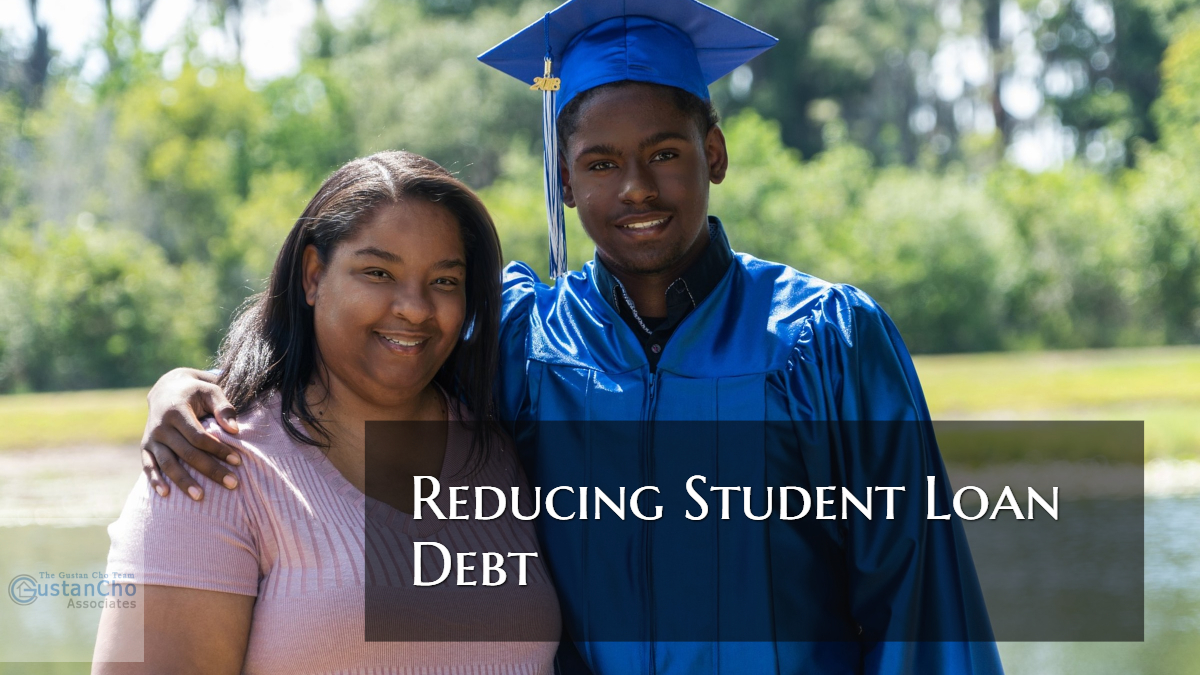How To Qualify For a Mortgage With Student Loan Debts
In this blog, we will cover getting qualified for a mortgage with student loan debts. Student loan debts and car payments are the two biggest hurdles in qualifying for a mortgage. Homebuyers can qualify for a mortgage with student loan debts. However, even if the student loan debt is in deferment, the student loan debts will count toward debt-to-income ratio calculations.
Buying House With Student Loan Debt And Qualifying For A Mortgage can often be a hurdle for homebuyers. College tuition and fees can surpass $50,000 annually. Many college graduates have student loan balances north of $100,000 plus. Those with master’s and/or professional degrees often have student loan balances over $250,000 or more.
The average starting salary for recent college graduates with no work experience is $48,000 per year. For those with master’s and/or professional degrees, their starting salaries average $63,500. Many college graduates have their student loans in deferment for many years until they make good salaries where they can afford them. However, many cannot afford to make fully amortized student loan payments. Buying House With Student Loan Debt And Qualifying For A Mortgage is possible.
Do Student Loan Debts Count As Monthly Debt For Mortgage?
Do student loans count as monthly debt for mortgage even though they are deferred for longer than twelve months? HUD, Fannie Mae, and Freddie Mac no longer exempt deferred student loan debts from debt-to-income ratio calculations.
As is the case with a conventional loan, your student loans will be considered in your debt obligations, and your lender will derive the monthly payment amount from your credit report or student loan statement. Student loan payments are included in your debt-to-income ratio when you apply for other types of credit, and they can impact your ability to take on new debt, particularly a mortgage loan.
Can You Lower Your Monthly Student Loan Debts?
Borrowers with high student loan debts need to think about being creative to lower your monthly student loan payments. If you are looking to buy a home but are concerned that your debt-to-income ratio will be too high because of student loan debt payments, this article discusses options to reduce monthly student loan payments.
A deferment or forbearance allows you to temporarily stop making your federal student loan payments or temporarily reduce your monthly payment amount. This may help you avoid default. Note: Interest still accrues during deferment or forbearance.
Reducing monthly student loan debts can significantly reduce the monthly debt-to-income ratio.
How To Lower Your Monthly Student Loan Debt Payments To Qualify For a Mortgage
HUD, Fannie Mae, and Freddie Mac all now accept income-based repayment. Even if you have a zero monthly payment IBR payment, then you do not have to count the student loan debts in your debt-to-income ratio calculations. There are other creative ways of lowering your monthly hypothetical student loan payments to qualify for a mortgage.
Other Ways of Lowering Your Monthly Student Loan Monthly Payment To Qualify For a Mortgage
Consumers applying for student loan repayment using one of these options can reduce their debt-to-income ratio in less than 30 days in most cases. Many people do not even know these programs exist.
Let’s say for example:
- are repaying your student loans using the standard repayment plan
- which is 10 years
- and monthly student loan payment is $700
- this could make or break an approval to purchase a new home
Imagine getting that payment cut in half or even more, possibly down to zero.
Cost of An Education Price of Student Loan Debts
The cost of education has increased dramatically over the last two decades. Many graduates are looking for ways of reducing monthly student loan debt. The U.S Department of Education reports that the average annual tuition is currently $16,482 for a four-year public school and $34,193 for a private school.
This is up from $8,653 for a four-year public school and $21,373 for a private school in 2000. Currently, there is approximately $1.3 trillion in outstanding student loan debt in the United States. With the increasing cost of tuition, many young students are forced to take out student loans to help with the rising costs of tuition.
Repayment Alternatives To Student Loan Debts
Once student graduates from school, they generally have six months before forbearance ends. Graduates are required to begin making payments. There are many payment alternatives when it comes to paying back student loans. Student loan debt repayments through a 10-year standard repayment plan. This is ideal because you pay the loan off sooner with the least amount of interest, although monthly payments are higher
Student Loan Debts Graduated Repayment Plan
Payments start low, while graduates are new in their careers, and income is expected to increase as they gain more experience in their field. While the payments start low, they get excessively high toward the end.
Extended Repayment Plan on Student Loan Debts
Allows you to pay for a period of up to 25 years, although these are only for loans that are at least $30,000.
Income-Based Repayment Plans on Student Loan Debts

Income-based repayment plans offer individuals an option to pay off their student loan debt based on their adjusted gross income and is a great option for reducing monthly student loan debt. Under these plans, the individual must re-certify each year by providing a copy of their annual federal income tax return. The monthly payment can be as low as $0 every month. Debt can be forgiven after 25 years, although this may be a taxable event (forgiven debt can be counted as income).
Reducing Monthly Student Loan Debts To Lower DTI
Under HUD Guidelines, all government and conventional loan programs with the exception of VA Loans do not exempt deferred student loans that have been deferred for 12 or more months. Income Based Repayment Plans (IBR) that report to all three credit bureaus are allowed on Conventional loans.
Now, HUD and USDA allow income-based repayment on FHA and USDA loans. FHA and USDA require 0.50% of the outstanding student balance to be used as a hypothetical monthly debt. VA allows deferred student loans that are deferred for longer than 12 months to be exempt from DTI Calculations. VA requires underwriters to take 5% of the outstanding student loan balance and divide it by 12 months.
Forgiveness of Public Student Loan Debts
An individual that works for a government organization, not-for-profit, or serves in AmeriCorps or Peace Corps, may qualify after 120 payments and 10 years of work history in public service. The individual must be making payments through an income-based repayment plan to benefit. Under an income-based repayment plan, a student can virtually pay nothing toward their student loans. After 120 months, the debt will be forgiven and in this situation would NOT be a taxable event.
Choosing The Best Way To Structure Student Loan Debts For Mortgage
When applying for student loan repayment programs, one needs to consider their personal financial situation. Currently, a married borrower can file married filing separately. They exclude the spouse’s income from the household income calculation. This may benefit those borrowers who earn less income than their spouses and their spouses do not have student loan debt. You would need to be sure that a married filing separate filing status would financially benefit you as you would lose credit for child tax credits, child care costs, education credits, and possibly other deductions.
Hurdles With Buying House With Student Loans For Recent College Graduates
There are hurdles Buying House With Student Loan Debt. This holds especially true for recent college graduates with high student loan balances. The common word on the street is that it is impossible to buy a home right out of college with high student loan balances. This is not the case at Gustan Cho Associates. Over a quarter of our borrowers are first-time homebuyers who recently graduated from college with student loans.
More than 44 million graduates of colleges and/or technical schools owe over $1.5 trillion in student loan debt in the United States. 2.3 million people owe student loan debts with at least a $100,000 loan balance. Over $32 billion in student loan debt is past due 90 days or more. Over $900 billion in student loan debts are owed by borrowers who are 40 years or younger. The biggest hurdle with buying a house with student loans is the debt to income ratio. With the exception of VA Loans, loan programs take into account deferred student loans when qualifying borrowers.
HUD And USDA Guidelines On Student Loans On FHA Loans
HUD and USDA have the same student loan guidelines when it comes to qualifying for FHA and USDA Loans. HUD, the parent of FHA, and USDA require a monthly fully amortized student loan payment to be used. Deferred student loans do not count.
Income-Based Repayment (IBR) is now allowed on conventional and FHA loans. The borrower can get a hypothetical fully amortized monthly payment over an extended-term in writing by the student loan provider. The hypothetical monthly payment can be used on student loans that are on deferment and/or on IBR if the amortized payment is lower.
If the borrower cannot get a fully amortized monthly payment by the student loan provider, both HUD and USDA require the lender to take 0.50% of the outstanding student loan balance and use this amount as a hypothetical monthly debt of the borrower.
Buying House With Student Loans With VA Home Loans
The Department of Veterans Affairs (VA) has the laxest guidelines when it comes to buying house with student loans. The VA is the only mortgage agency that allows deferred student loans to be exempt from debt to income calculations. This only holds true if the student loans have been deferred for longer than 12 months.
Otherwise, for non-deferred student loans, the following applies:
- The VA will accept a fully amortized monthly payment over an extended term
- IBR Payments are not acceptable
- Or the VA requires to take 5% of the outstanding student loan balance and divide that figure by 12 months
The resulting figure will be the hypothetical monthly payment to be used on VA Loans.
Buying House With Student Loans With Conventional Loans
Conventional Loans is the only loan program that allows Income-Based Repayment (IBR). This only holds true if the student loan provider reports the monthly IBR Payment on all three credit reporting agencies. In the event, if the student loan provider does not report the IBR on all three credit bureaus, the loan officer can do a rapid rescore. A rapid rescore normally takes 3 to 5 business days.
Non-QM Loans normally accept deferred student loans. This only holds true if the deferred student loans have been deferred for longer than 12 months.
Best Mortgage Lenders For High Student Loan Debts
This article on Reducing Monthly Student Loan Debt was written by Michael Gracz of Mortgage Lenders For Bad Credit. Michael Gracz is the National Sales Manager for Mortgage Lenders For Bad Credit, Inc. Michael is also an associate moderator for Mortgage Lenders For Bad Credit online forum. Mike is a producing loan officer with Mortgage Lenders For Bad Credit. Armed with a Master of Business Administration degree and a Master’s degree in accountancy, Mike is an expert in all areas of accounting and audits. Mike is an expert on FHA Loans, VA Loans, USDA Loans, and Conventional Loans
Mike is known nationally and due to being associate editor-in-chief for California Loan is well known in the Sacramento Real Estate community as the go-to lender for tougher and creative deals. Mortgage Lenders For Bad Credit, Inc. is a national mortgage company that is licensed in multiple states.
With a nationally known reputation for no lender overlays and working with borrowers to make the deal happen Michael has a national five-star reputation. A mortgage loan denial does not exist in Mike Gracz’s vocabulary. All of our pre-approvals at Mortgage Lenders For Bad Credit, Inc. will not get closed but closes on time.
Starting Pre-Approval Process With Mortgage Lenders For Bad Credit With No Overlays
Michael Gracz of Mortgage Lenders For Bad Credit, Inc. fully understands that the pre-approval stage is the most important phase of the mortgage process. The main reason for last-minute mortgage denials is due to the loan officer not being diligent when issuing a pre-approval to the borrower. Due to Mike’s expertise in accounting and financial audits,
Mike is Mortgage Lenders For Bad Credit, Inc.’s chief income calculations expert for our licensed mortgage loan officers. Calculating income is extremely complex for self-employed borrowers who have multiple corporate tax returns. Mike is a team player and a natural-born leader and our whole team and staff look up to him for his expertise and guidance and leadership.







